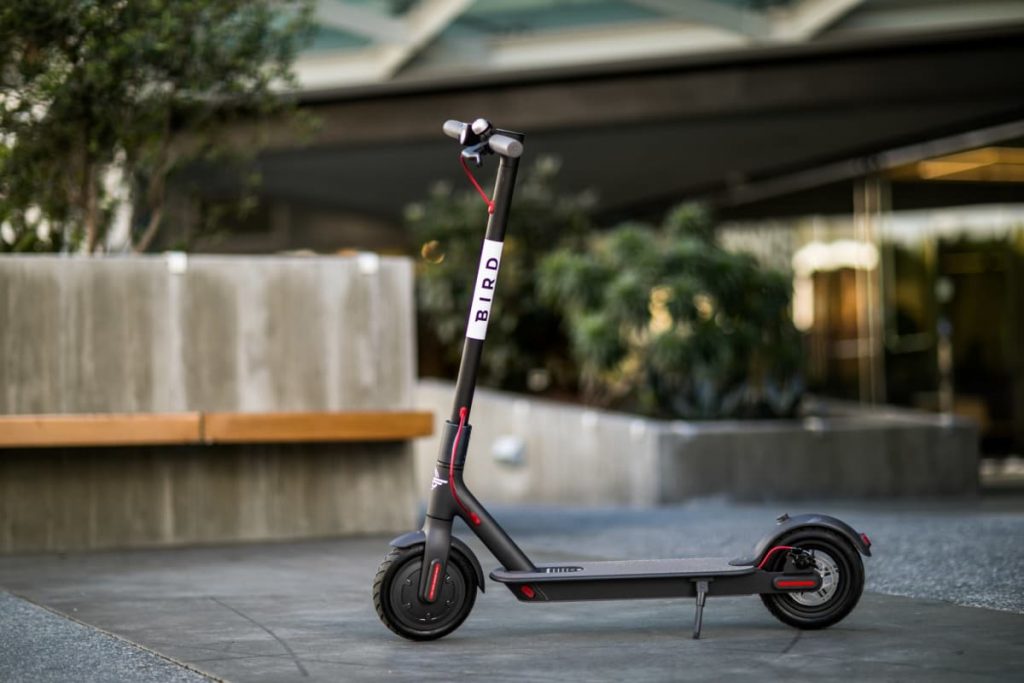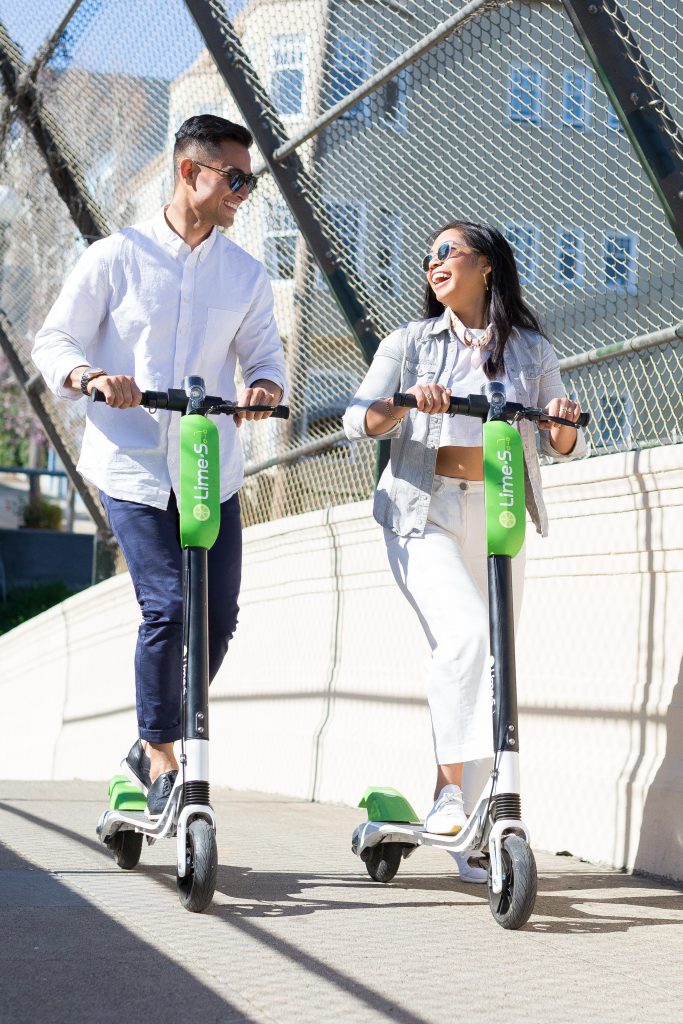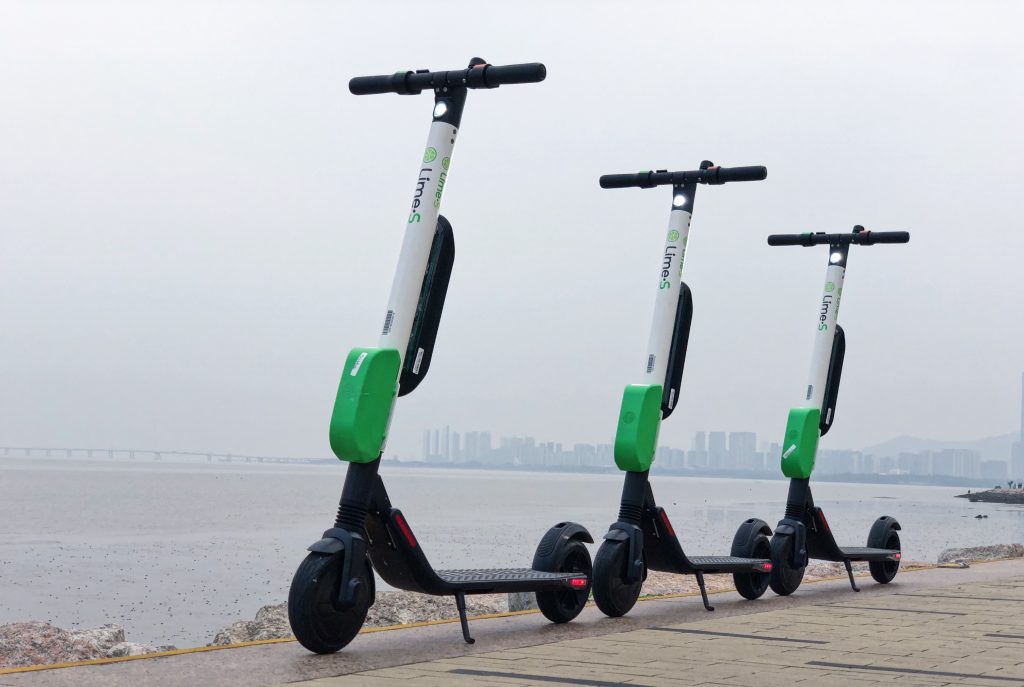
— Photo via Bird Scooters
As far as motorized shared mobility devices go, like the electric scooters that suddenly popped up on the Balboa Peninsula this summer, the Newport Beach City Council is on the fence.
These types of devices, typically scooters and bikes, are shared by numerous users throughout the day utilizing a mobile application. They are “dockless,” meaning there is no established pick-up or drop-off location and riders leave them, often laying on public sidewalks, for the next rider to hop on.
They are meant to be convenient, fun and inexpensive way to go that “last mile.”
Following a short study session and an hour-long discussion during the regular meeting, Council voted 5-1 on Tuesday, with Councilwoman Diane Dixon dissenting and Councilman Kevin Muldoon recusing himself because of business interests, to take no action unless an operator comes up with an acceptable plan for a permit that works completely within the city’s current municipal codes, which would then head to the Planning Commission. Council would still have the ability to review the Planning Commission’s decision.
It should be up to the business to look at the city’s laws and figure out how to comply with them, said Mayor Pro Tem Will O’Neill.
“If there is a possibility, and I don’t know how, honestly, there is a possibility, with the business model they’ve got, but if there is a possibility that a company can adequately comply with our laws, I don’t think it’s appropriate for us to tell them they cannot even try to get a permit,” O’Neill said. “If they can’t, then they don’t get a permit. If they can, then let’s see them explain it to the Planning Commission.”
Some of the local laws in concern include a commercial operation using a public right of way without authorization, motorized vehicle on the boardwalk, speed limits, and blocking sidewalks.
Dixon, whose district includes the Balboa Peninsula, said there should be a thoughtful process to study the issue first. There might be a business plan that can work within the city’s existing code, but there are a lot of issues to figure out first, she noted.
“My mind is open, but let’s wait and see,” she said. “I’d kind of like to see how this all shakes out.”
Dixon suggested a moratorium, which she later clarified could instead just be something that pauses any action until more information is gathered, but that was ultimately not included in the final motion.

— Photo courtesy LimeBike
“The boardwalk is at full capacity,” now, she pointed out. “We don’t have to say, ‘Yes’ to everything.”
The point of a moratorium is being able to study the larger issue then make decisions, explained City Attorney Aaron Harp.
The discussion primarily focused on Bird and LimeBike scooters.
Bird electric scooters were “dropped” on Balboa Peninsula on July 28 without any advance discussion or notification to the city, explained City Traffic Engineer Brad Sommers.
“We received a pretty much immediate and somewhat negative response from the community,” Sommers said.
The city contacted Bird and notified them that were in violation of the city’s municipal code that prohibits commercial operation within public right of way without authorization. Bird complied and removed most scooters, Sommers said. A few strays were picked up by city crews and returned to Bird.
There were several comments by Council members and residents that criticized Bird’s implementation without authorization strategy.
“I have to be honest, there’s a part of me that really resents their whole marketing strategy by dumping and getting a lot of free publicity and free advertising by the act of having dumped their product on our streets,” Councilman Jeff Herdman opined.
A couple of Peninsula locals also mentioned that a business that deliberately avoids contacting the city first, which implies that the business is trying to sidestep complying with the local codes, and instead utilizes a “guerilla-style” approach by is disrespectful.
Dixon asked the Bird representative on hand about the tactic of having the scooters “magically appear” on city streets.
“It’s asking for forgiveness, not permission,” Dixon said.
Seeing them suddenly on the Peninsula without any prior notice or authorization was “insulting,” Dixon said.
They try to communicate with city staff “as” the launches happen, said Bird Community Relations Manager for Southern California Morgan Roth.
The way Bird did it is not legal according to the way the municipal code is currently written, Harp explained.
Dixon noted that Lime approached the city before “dumping” the scooters in the city. Public Works Director Dave Webb added that Razor has also had discussions with city staff about the idea.
“That’s how it should be done, in a professional, respectable way,” Dixon noted.
The majority of speakers at both the study session and the regular meeting were opposed to the idea.
Speakers mentioned a number of issues: Safety, enforcement, clutter, creating a hazard, possible ADA concerns, moving too fast, tandem riding, no regulation, and quality of life.
Lifetime Newport Beach resident Kent McNaughton said he has noticed these types of scooters showing up at a number of coastal cities, with local officials unsure on how to handle them.
“Newport Beach is the latest victim of this scooter dump,” McNaughton said.

— Photo courtesy LimeBike
The idea was meant for more metropolitan cities, commuters grabbing one to get from the train or bus to work, he explained.
“This is not for Newport Beach,” McNaughton said. “It has no benefit for Newport Beach, either the tourists or the residents.”
There have been reports of people throwing these scooters in the ocean or bay, in trash cans, and even lighting them on fire, McNaughton reported. It’s just bringing trash and crime to the city, he noted.
“They are totally unregulated,” McNaughton added. “It’s totally out of control.”
Roth said Bird is concerned about safety.
They have worked on providing free helmets for a number of events and organizations. They have handed out more than 50,000 helmets, Roth said.
Roth also offered an interim operating agreement that they have used with other cities that details their “commitment to working with the cities,” which includes assuming liability and revenue sharing program to help with sustainable infrastructure for the future.
Lime Operations and Logistics Manager Devin McLean said they are dedicated to working with the city on the issue.
The scooters are equipped with GPS. They also have “geo-fence” capabilities, in order to create “no ride” or “no park” zones, McLean said, but it only sends alerts to the rider’s phone, it can’t shut the scooter down or take any action.
Both Lime and Bird representatives said they have measures to encourage good behavior.
Councilman Brad Avery noted that it’s a new, popular business model and people seem to enjoy the devices.
“It is coming,” Avery said, so it might be worth seeing how it could possibly work. It very well might work, but they need more information first, he added.
“We can just hang back and see how it’s working in other cities,” Avery said. “We don’t need to be the first one to figure this out.”





Is there any legislation against Electric Bikes on the Boardwalk (pennisula)? Most are going well over the stated speed limit of 8mph. Most can go 20+ Mph It’s just a matter of time before there’s a serious collision.